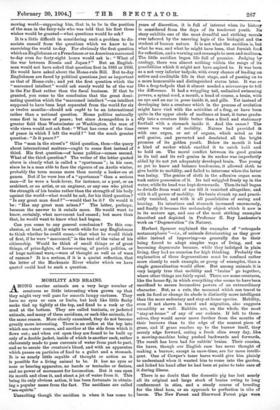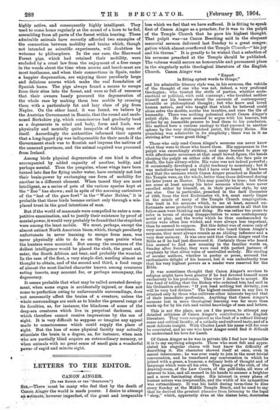MOBILITY AND BRAINS.
AMONG marine animals are a very large number of creatures so little interesting when grown up that they might very well pass for smooth lumpy cactuses. They have no eyes or ears or limbs, but look like little fleshy sacks tied up tightly at the top, and fixed to a rock or the mud at the bottom. They are called tunicata, or jacketed animals, and many of them ascidians, or sack-like animals, for the same reason. More closely examined, they do not become greatly more interesting. There is an orifice at the top into which sea-water comes, and another at the side from which it flows out ; and when cut open they are found to be built up only of a double jacket, inside of which is another sack, rather elaborately made to pass currents of water from part to part, and so to aerate the creature's blood, and with an apparatus which passes on particles of food to a gullet and a stomach. It is as nearly little capable of thought or action as it is possible for a living animal to be. It has no eyes or nose or hearing apparatus, no hands or tentacles or feelers, and no power of movement for locomotion. But it can open its mouth and close it, and shoot a jet of water from it. This being its only obvious action, it has been fortunate in obtain- ing a popular name from the fact. The ascidians are called " sea-squirts."
Unexciting though the ascidian is when it has come to years of discretion, it is full of interest when its history is considered from the days of its tenderest youth. Its story exhibits one of the most dreadful and striking morals ever inferred by the unerring logic of the biologist and the student of human nature. It is not what the ascidian is, but what he was, and what he might have been, that furnish food for reflection, and a warning and ensample to men and molluscs. The little ascidian began life full of promise: Judging by analogy, there was almost nothing within the range of its possibilities which it might not have aspired to. It was born as a not very inferior tadpole, with every chance of leading an • active and creditable life in that stage, and of passing on to a more honourable and distinguished status later. It was so like a frog-tadpole that it almost needed a microscope to tell the difference. It had a wriggling tail, unlimited swimming powers, a spinal cord, a mouth, a head of course, a brain, with an eye and an ear in posse inside it, and gills. Yet instead of developing into a creature which in the process of evolution might have vied with the activities of a frog, or have been quite in the upper circle of molluscs at least, it turns gradu- ally into a creature little better than a fixed and stationary football with a stomach inside it. And the cause ? The cause was want of mobility. Nature had provided it with one organ, or set of organs, which acted as its evil genius, and perverted and desolated all the bright promise of its golden youth. Below its mouth it had a kind of sucker which enabled it to catch hold and to hold on. The moral conflict between its good genius in its tail and its evil genius in its sucker was imperfectly aided by its not yet adequately developed brain. Too young as yet to know and balance tendencies, it allowed sloth to give battle to mobility, and failed to intervene when the latter was losing. The genius of sloth in the adhesive organ soon took entire possession of it. lts tail wriggled freely up in the water, while its head was kept downwards. Then its tail began to dwindle from want of use till it vanished altogether, and with it all power of mobility. Its brain shrank up and practi- cally vanished, and with it all possibilities of seeing and hearing. Its intestines and stomach increased enormously, and finally it became the melancholy object which it now is in its mature age, and one of the most striking examples described and depicted in Professor E. Ray Lankester's work on "Degeneration" (in Nature).
Herbert Spencer explained the examples of " retrogade metamorphosis "—i.e., of animals deteriorating as they grow older instead of improving—as generally due to their being forced to adopt simpler ways of living, and so becoming degenerate because, while they indulged in plain living, they had no occasion for high thinking. Probably the explanation of these degenerations must be confined rather more closely to each example, or group of examples, than a single generalisation would allow. But among animals it is very largely true that mobility and "brains" go together, where other things are fairly equal. There are some creatures, like the house-fly, in which everything else seems to have been sacrificed to secure locomotive powers of an extraordinary character. But, as a rule, the mammal which can travel to seek its food or change its abode is distinctly more intelligent than the more sedentary and stay-at-home species. Mobility, even if not shown in travel and migration, also suggests versatility as well. Rabbits are, on the whole, the most " stay-at-home " of any of our rodents. If left to them- selves, they would never move further from the mouths of their burrows than to the edge of the nearest piece of grass, and if grass reaches up to the burrow itself, they merely edge forward, eating a fresh slice every day, like a mowing-machine being pushed backwards and forwards. The result has been bad for rabbits' brains. Their cousins, the hares, though our English race has never thought of making a burrow, except in snow-time, are far more intelli- gent. One of Cowper's tame hares would give him plainly to understand when it wanted him to come into the garden, and licked his hand after he had been at pains to take care of it during illness.
There is no doubt that the domestic pig has lost nearly all its original and large stock of brains owing to long confinement in sties, and a steady course of breeding for the ideal ham, or an approach to perfection in ribs of bacon. The New Forest and Sherwood Forest pigs were
highly active, and consequently highly intelligent. They used to come home regularly at the sound of a horn to be fed, assembling from all parts of the forest within hearing. These admirable animals have recently afforded two examples of the connection between mobility and brains which, though not intended as scientific experiments, will doubtless be welcome to philosophers. In the one case, the Sherwood Forest pigs, which had retained their mobility, were excluded by a cruel law from the enjoyment of a free range in the woods about the time when acorns and beech-mast are most toothsome, and when their connections in Spain, under a happier dispensation, are enjoying those peculiarly large and delicious acorns which make the real foundation of Spanish hams. The pigs always found a means to escape from their sties into the forest, and were so full of resource that their owners basely procured the degeneration of the whole race by making them less mobile by crossing them with a particularly fat and lazy class of pig from Naples. On the other hand, it was found, we believe by the Austrian Government in Bosnia, that the round and snub- nosed Berkshire pig, which connoisseurs had gradually bred as a degenerate in mind and body, form and limb, was physically and mentally quite incapable of taking care of itself. Accordingly the authorities informed their agents that a long-legged pig was indispensable for their needs if the Government stock was to flourish and impress the natives of the annexed provinces, and the animal required was procured from Ireland.
Among birds physical degeneration of one kind is often accompanied by added capacity of another, bodily, and perhaps mental. Thus the penguins, whose wings have been turned into fins for flying under water, have certainly not lost their brain-power by exchanging one form of mobility for another in a different element. When tamed they are most intelligent, as a series of pets of the various species kept at the " Zoo " has shown; and in spite of the amusing caricature of the "last of the gare fowl " in the " Water Babies," it is probable that these birds became extinct only through a mis- placed trust in the good intentions of man.
But if the world of mammals were compelled to enter a com- petitive examination, and to justify their existence by proof of mental power, it would very probably be found that the stupidest were among the least mobile. We must, perhaps, except the almost extinct North American bison, which, though peculiarly unfortunate in never learning to escape from man, was never physically able to do so on the open prairie when the hunters were mounted. But among the creatures of the dullest intelligence would be placed the sloth, the great ant_ eater, the South African ant bear, and probably the wombat. In the case of the first, a very simple diet, needing almost no thought to obtain, and of the second and third, a food range of almost the most limited character known among creatures eating insects, may account for, or perhaps accompany, the degeneracy.
It seems probable that what may be called arrested develop- ment, when some organ is accidentally injured, or does not come to perfection owing to unfavourable surroundings, does not necessarily affect the brains of a creature, unless the whole surroundings are such as to hinder the general range of its faculties, as, for instance, the blindness of some of the deep-sea creatures which live in perpetual darkness, and which therefore cannot receive impressions by the use of sight. It is very difficult to suppose or imagine any appeal made to consciousness which could supply the place of sight. But the loss of some physical faculty may actually stimulate the brain in a degree, as, for instance, when men who are partially blind acquire an extraordinary memory, or When animals with no great sense of smell gain a wonderful power of rapid and minute sight.











































 Previous page
Previous page